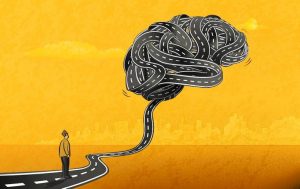Understanding Executive Dysfunction: Rewriting the Narrative of Focus, Flexibility, and Control
The human brain relies on three core executive functions to support daily living. These include working memory, which allows you to hold and manipulate information in the moment; cognitive flexibility, which enables you to shift your attention between tasks or ideas; and inhibitory control, which helps you pause, reflect, and choose your responses rather than react impulsively.
When these functions are disrupted, a condition referred to as executive dysfunction, it may be challenging to organize thoughts, regulate emotions, or manage behavior in ways that align with one’s values or goals.
From the perspective of narrative therapy, these struggles are not who you are; they are experiences you are having. Together, we can begin to understand how executive dysfunction has shaped your current story and how you can begin to reclaim authorship of that story with intention and self-compassion.
What Causes Executive Dysfunction?
Researchers continue to explore the underlying causes of executive dysfunction. Evidence suggests that it can arise from a wide variety of neurological, psychological, and environmental factors, including:
-
Addiction
-
Alzheimer’s disease
-
Attention-deficit hyperactivity disorder (ADHD)
-
Autism spectrum disorder
-
Brain tumors
-
Cerebral hypoxia
-
Exposure to environmental toxins
-
Dementia
-
Depression
-
Epilepsy
-
Head injuries or trauma
-
Huntington’s disease
-
Infections affecting the brain
-
Multiple sclerosis (MS)
-
Obsessive-compulsive disorder (OCD)
-
Schizophrenia
-
Stroke
Because executive dysfunction is often a symptom of a broader condition, treatment is most effective when it addresses the root cause.
Recognizing the Symptoms
Executive dysfunction can present differently depending on a person’s unique context and life story. Some everyday experiences include:
-
Becoming easily distracted or unable to concentrate
-
Daydreaming when attention is needed
-
Struggling to shift attention from one topic or task to another
-
Hyperfocusing on a single idea or activity
-
Having difficulty regulating impulses
-
Feeling unable to explain thought processes clearly
-
Finding it hard to start tasks, especially those that feel complex or uninteresting
-
Losing track of goals midway through a task
-
Struggling to organize, prioritize, or complete steps toward a larger objective
In Cognitive Behavior Therapy (CBT), we often explore how these symptoms influence your self-beliefs and how to challenge the negative thought patterns that may accompany them. For example, a persistent belief such as “I am lazy” may stem from years of difficulty completing tasks, not from truth, but from misattributed patterns. Together, we can reframe those beliefs with more accurate, empowering thoughts.
A Mindful and Strength-Based Path Forward
Mindfulness practices can help you become more aware of when executive dysfunction is present, without judgment. By cultivating awareness of the moment and responding rather than reacting, you can begin to interrupt unhelpful cycles and create space for healthier patterns.
Through positive psychology, we will also identify your strengths. Executive dysfunction may make certain areas feel like uphill battles, but that does not erase your creativity, resilience, insight, or kindness. Together, we can build routines and structures that draw upon your strengths while supporting the more challenging areas.
Let Us Begin This Work Together
If you are experiencing executive dysfunction, I invite you to reach out. I work with individuals navigating the impact of these challenges on focus, memory, motivation, and emotional well-being. In our work together, I offer a space where you can rewrite your story, identify what truly matters to you, and develop strategies to align with your values.
You are not alone, and you are not broken. There is hope, and there is support available.
Please feel free to contact me to schedule an appointment. I would be honored to help you take the next step forward.




